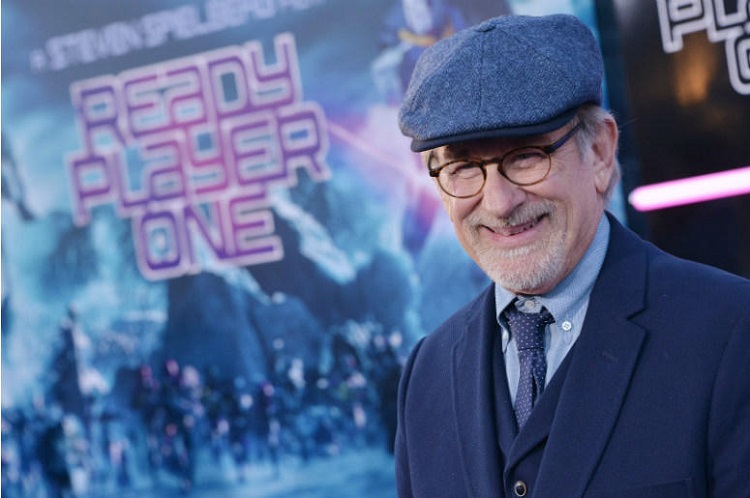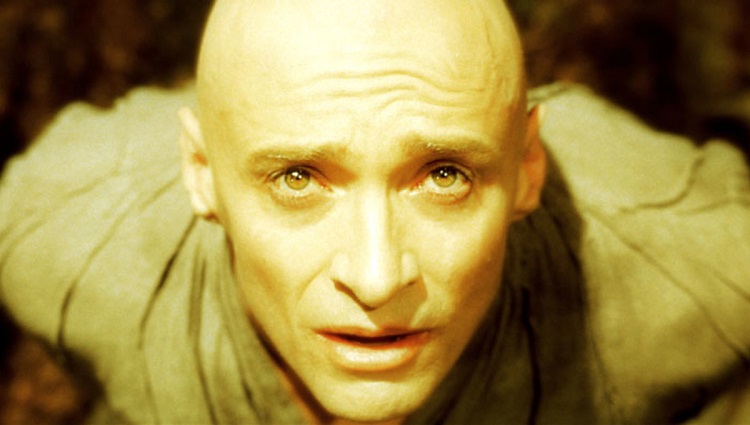
Whether he intended to or not, Steven Spielberg set the Internet ablaze this weekend when he announced he would approach the Academy Board of Governors next month and propose rule changes that potentially bar films distributed by Netflix (or any other streaming platform) from gaining Oscar nominations without first having some sort of exclusive theatrical release. It was not indicated what an appropriate release length would be.
As expected, debate was passionate on both sides of the issue with many agreeing that a theatrical release window shouldn't be out of the question. The Academy of Motion Picture Arts and Sciences is certainly well within their rights to require a theatrical window, and I can understand why. Films, generally, are made to be seen in a theater, and that experience and environment is the ideal way to view what the artists involved have crafted. (Theoretically at least. More on that later.) Additionally, the Academy does not recognize or nominate direct-to-video (DTV) releases. The Tony Awards do not recognize or nominate plays that are Off-Broadway. Et cetera. If your intent is to honor films that have been distributed and viewed in a certain manner, that's the prerogative of AMPAS and godpseed to them.
That said, it brings up a whole host of questions to be answered, not the least of which being: If you're going to require films be released theatrically, why not require that Academy members view them theatrically before they are able to cast a single vote in any category? After all, it's been de rigueur for years now to distribute DVD screeners of films to Academy members once awards season approaches. Given that Spielberg's proposed rules are intended to preserve the so-called sanctity of the theatrical experience, it seems more than a little hypocritical to then give a wholesale pass to countless voters who have not, and in many cases will not, see these movies in the intended environment and format.
But more than that, it revives the argument of "Just what makes a movie a movie? What's the dividing line between a 'made for TV movie' and capital C cinema?" The argument goes, from The Beard himself, that a movie made to be consumed first and primarily at home is not and cannot be Cinema. To wit, from an interview with ITV News last March: "Once you commit to a television format, you're a TV movie. You certainly, if it's a good show, deserve an Emmy, but not an Oscar. I don't believe films that are just given token qualifications in a couple of theaters for less than a week should qualify for the Academy Award nomination."

Spielberg may have a point, but in order for that point to be valid it requires thinking that budgets, crews, directors, and hell, even televisions have not evolved and improved drastically since Spielberg cut his teeth (ironically enough, I suppose) as a director of TV movies back in the '70s. Watch Beasts of No Nation, The Ballad of Buster Scruggs or Roma and tell me that those films in any way shape or form resemble what one expects when hearing the term "Made-for-TV Movie." Granted, not all Netflix Original Films (or Amazon Studios films, etc.) are as good as those three mentioned, but there are plenty of horrible theatrically released films too. A release format doesn't automatically make one film better or more worthy than another.
More to that point, though, is that this really does bring up the question of, in the year 2019 what exactly IS cinema? Huge, high-definition television sets are more common than ever. Quality sound systems are more common than ever. The window between theatrical release and streaming/home video release narrows further every year. Combine that with the fact that the theatrical experience for most people is absolute garbage when patrons often refuse to stop talking/texting/making noise/being generally disruptive. Plus the fact that far too many theater venues are in disrepair and don't even have proper projection and sound anymore. It's no wonder that more people than ever are simply waiting for a film to hit Netflix or Redbox or iTunes before they watch it from the comfort of their own home on a huge TV, where they don't have to worry about inconsiderate jerks kicking their seat or texting and can watch the film with better picture quality and sound than they would perhaps get at their theater. All for the cost of what ONE ticket would be. (And that's assuming they bought it and didn't just rent it for an even smaller fraction of the cost, or got it as part of the ridiculously cheap streaming package they pay for.)
All that to say, a LOT of people likely decided to skip seeing Spielberg's latest film, Ready Player One, in the theater and instead opted to rent it or buy it. Does this mean that, quality of the film itself aside, Ready Player One is somehow less of a film? Is it now, somehow, NOT capital C cinema? Certainly, I don't think that anyone would argue that a dark theater, offering pristine projection and sound, and filled with quiet and respectful and engaged patrons who are just as eager as you to watch, is the ideal way to experience a movie. But unless your job revolves around seeing films in a theater, or you're perhaps an incredibly powerful and wealthy Hollywood director who has a literal theater-sized screening room attached to his home, chances are most of the movies you see in your lifetime will be at home in conditions that are far from what Spielberg and many others deem as "ideal."
Does this make those movies, movies that were specifically designed and envisioned and filmed to be seen theatrically, suddenly lesser than, as it were?
I would argue that it does not. Spielberg, in a way, proved this.
Let's go back to Baton Rouge, LA sometime around the mid-90s. Let's say around 1995. Hi, it's me, Stewart Smith. I'm about 14 years old and I'm a burgeoning film fan. Some of my favorite films I've seen include Raiders of the Lost Ark, Indiana Jones and the Last Crusade, Jurassic Park and Hook. All movies directed by Spielberg. All of them seen not in the theater, but on a 25-in CRT television in a well-lit living room and via pan-and-scan format VHS video tape. In other words, probably the absolute worst way to watch those films when you consider what their creator envisions as "necessary conditions" for a movie to be a "real" movie.
And yet, I loved them regardless. I didn't know what I was missing, granted, and I would never even begin to argue that seeing Raiders or Jurassic Park on an IMAX screen wasn't anything short of life-affirming. The point is that a format or screening condition doesn't automatically make a movie better, or even necessarily make it "not a movie." I was affected and fell in love because they were incredible movies made with love.
Additionally, it cannot be ignored that taking a "theatrical only" approach is a blindingly privileged take at best, stubbornly elitist at worst. Never mind the fact that Spielberg has a literal movie theater in his own home where he would have little trouble arranging for a screening of nearly any film you could think of. He lives in Los Angeles, a city where you can not only find even the most limited of theatrical releases, but there are a plethora of revival and repertory theaters that play old and obscure films year-round. It's an embarrassment of riches for anyone who loves movies and wants to see them "as intended."
That doesn't do a whole lot for, say, a guy who has lived most of his life in small towns in the South but who loves movies and wants to be part of The Conversation, as it were. As it currently stands, if I want to go see the most talked-about limited release films, I have to hope and pray they eventually show up here months after they've been talked about and analyzed to death, or make a two-hour drive one-way to the Dallas area when it shows up at one of the arthouse theaters there. Even when I did live in a Big City, it was nearly impossible to see ANY movie, even a wide release blockbuster. Never mind the fact that my family didn't have much money (thus necessitating that most of our theatrical experiences were at the second run "dollar theater" where the prints were scratchy and your feet stuck to the floor), it was impossible for a kid to just get around on his own. Baton Rouge back then had a joke of a mass transit system, so there was no hopping on a train or subway and going "into the city" to catch a movie. Because the city was so sprawled out, even the idea of riding my bike to one of the few theaters in town was out of the question.
Imagine, though, if I'd had Netflix back then. Imagine if instead of having to wait for the chance to go to the dollar theater, or god knows how long for a movie to hit VHS (and then be at the mercy once more of whether my parents would let me rent something in the first place), imagine if it were simply at my fingertips immediately. What an experience that would be for anyone, much less a burgeoning film fan.

And again, this isn't to diminish the importance or power of going to a movie theater. I've had some experiences at the theater that were beyond anything I could ever hope to have at home. For instance, going to see The Fountain was damn near transcendent for me. I was alone in the theater, and it washed over me like a tidal wave. I am not exaggerating when I say that I sat there in stunned, awe-struck silence for the duration of the end credits. When I finally made it out to my car, I called one of my best friends. They will attest that I was literally unable to fashion a complete, coherent sentence, so shaken was I by what I had just experienced. Nothing will ever be quite like when I was one of only 10 other men in a theater which sat nearly 300 other women at an opening night screening of Magic Mike. And when I say you could not tell where the movie stopped and the theater's audience began during the club scenes, I want you to know that there is literally no better way to have experienced that film.
But that doesn't change the fact (and it is an undeniable fact) that movie distribution is changing, as are the viewing habits of audiences. There are only going to be more movies made by and for services like Netflix. None of what I've said so far even gets into the fact that Netflix often supports and enables filmmakers who might not get such broad distribution support or funding for their work. Ava DuVernay, for instance, despite having made significant films for Disney and Paramount, has only had one film receive wide international distribution, and it was a film she made for Netflix.
At one point, saying a movie was "for TV" certainly carried weight. There was a clear and tangible line of demarcation between what was possible for "theatrical" movies and what got relegated to television. But it's clear now that line has been blurred to the point of meaninglessness. It's impossible to look at films made by genuine filmmakers like Alfonso Cuaron, Martin Scorsese, Cary Joji Fukunaga, Michael Bay, the Coen Brothers, Guillermo del Toro and Steven Soderbergh and say they're just "making stuff for TV."











